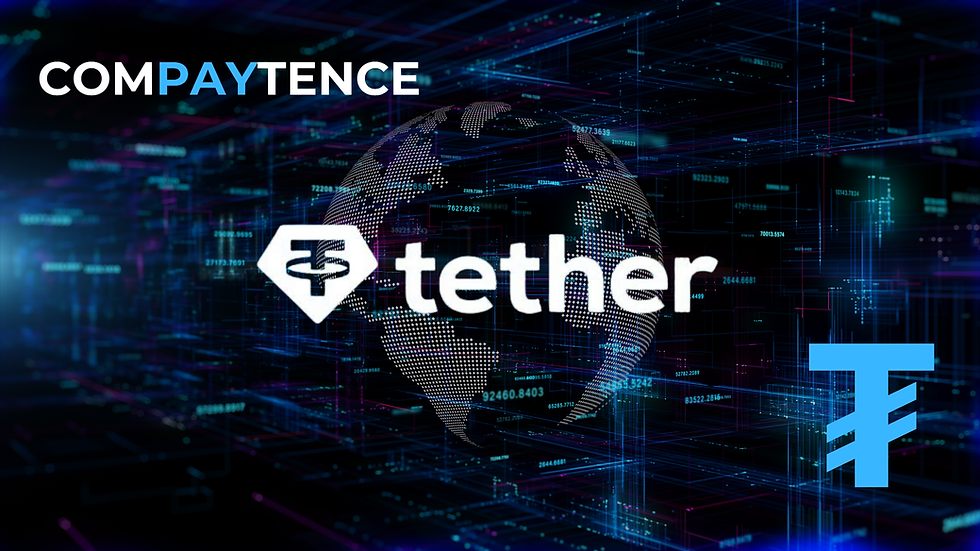Tether’s Expanding Empire: What 120+ Investments Signal for Global Payments Infrastructure
- Andrea Llamas
- Jul 25, 2025
- 4 min read
Tether, issuer of the world’s most dominant stablecoin, has entered a new phase—shifting from a financial services provider into an expansive force shaping the future of decentralized finance. While competitors like Circle’s USDC, PayPal’s PYUSD, and MakerDAO’s DAI have focused on regulatory alignment and stablecoin innovation, Tether is charting a more aggressive path: venture-backed expansion into infrastructure, mining, artificial intelligence, tokenized assets, and beyond.
With over 120 portfolio companies, Tether is no longer simply facilitating stablecoin liquidity. It is laying the groundwork for a vertically integrated crypto economy, while simultaneously pushing the boundaries of transparency, decentralization, and global financial influence.

From Stablecoin to Sovereign-Like Powerhouse
Tether issues multiple fiat-pegged and commodity-backed stablecoins across a growing list of blockchains. These include:
USDT: U.S. dollar-pegged stablecoin, circulating on Ethereum, Tron, Solana, Avalanche, Polygon, and others
EURT: Euro-pegged stablecoin
XAUT: Gold-backed token, backed by over 80 tons of physical gold
CNHT: Offshore Chinese yuan stablecoin
Their flagship product, USDT, holds a circulating supply exceeding $162 billion—more than any other stablecoin on the market. Tether asserts these tokens are fully backed by a mix of cash equivalents, U.S. Treasuries, and liquid assets, though the lack of independent third-party audits continues to draw scrutiny.

Strategic Capital Deployment Across Critical Sectors
Tether has invested in more than 120 companies, focusing on six key areas:
1. Bitcoin Mining & Energy Infrastructure
Bitdeer Technologies and Volcano Energy represent major plays in renewable-powered Bitcoin mining.
The company is aligning itself with the energy transition narrative, with geothermal, solar, and decentralized power systems central to its strategy.
2. Artificial Intelligence
Investments in privacy-preserving AI infrastructure and brain-computer interfaces suggest a vision for autonomous, compliant, and intelligent financial applications.
3. Payment Platforms & Financial Access
Companies like Orionx (Chile), CityPay, and XREX (Taiwan) advance Tether’s push into stablecoin-based merchant settlement and cross-border finance.
4. Blockchain Infrastructure
Through partnerships with Northern Data, Holepunch, Keet, and Synonym, Tether is funding decentralized identity, secure messaging, and alternative Layer 2 Bitcoin tools.
5. Asset Tokenization
Tether's equity stake in Elemental Altus Royalties—a Canadian gold miner—underscores its commitment to backing physical commodities with digital instruments like XAUT.
6. Biotech and Agriculture
Several unlisted ventures point to diversification into non-financial sectors tied to decentralization and sovereignty in supply chains.
This expansion has been fueled, according to CEO Paolo Ardoino, entirely by profits—with $13.7 billion generated in 2024 alone. Additionally, Tether claims to hold over $120 billion in U.S. Treasuries, which it uses as a risk buffer in its investment strategy.
The Narrative: Decentralization and Financial Equality
Tether’s messaging emphasizes empowerment and inclusion:
“We back projects that reduce reliance on centralized systems, promote privacy, and empower individuals globally.” — Tether Investment Portfolio Unveiled, July 2025
By building infrastructure across underserved regions in Africa, Latin America, and Asia, and rolling out tools that remove reliance on traditional banking, Tether positions itself as a force for financial equality.
But this raises questions:
Does Tether’s growing control over these decentralized tools contradict its stated mission?
Is this a push for inclusion—or a strategic power consolidation across the financial stack?

Payment Processing: The Next Frontier
Tether’s portfolio suggests a concerted effort to become a payments processing powerhouse. By investing in:
On-ramps and exchanges (Orionx, CityPay)
Smart contract-based escrow (Synonym)
Stablecoin-native merchant tools (XREX)
Private communication frameworks (Keet)
Tether is not merely supplying liquidity. It is attempting to control the rails, routing, and user-facing tools of the next-generation payment stack.
If successful, this would give Tether influence over how transactions are initiated, authorized, and settled—positioning it to rival legacy processors like Visa, PayPal, and Stripe, but with programmable, global digital assets.
A Financial Titan—or a Systemic Risk?
While Tether’s ambition is bold, skepticism is mounting:
The lack of public detail around how these investments are structured—equity, tokens, loans—raises transparency concerns.
Critics argue that investing profits into risky ventures could compromise USDT’s liquidity in times of market stress.
Comparisons to central banks and "printing money out of thin air" continue to circulate in the crypto community.
No independent audit has yet validated Tether’s claims about excess reserves.
And while Tether denies any linkage between its issuance and unbacked risk, the opacity of its balance sheet remains one of the most contentious issues in crypto today.

Expansion, Influence, and Scrutiny
Tether is rapidly transforming from a stablecoin issuer into a multi-sector venture operator with ambitions across the global financial system. By embedding itself in mining, AI, energy, payments, and communications, it’s pursuing influence at every layer of the digital economy.
Whether this results in greater financial inclusion—or centralization under a different name—remains to be seen.
As competitors double down on compliance and transparency, Tether’s scale and momentum will either solidify its role as the backbone of decentralized finance—or invite the kind of regulatory pressure that could reshape its trajectory altogether.
Sources:
Tether Investment Portfolio Unveiled – tether.to
Coin World: Tether’s $120B Holdings and Strategic Expansion
[Julie Binoche, “Tether Faces Growing Scrutiny,” CryptoDigest, July 24, 2025]




Comments